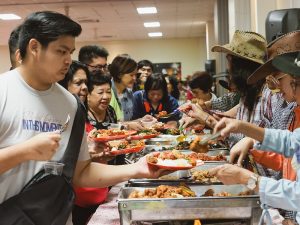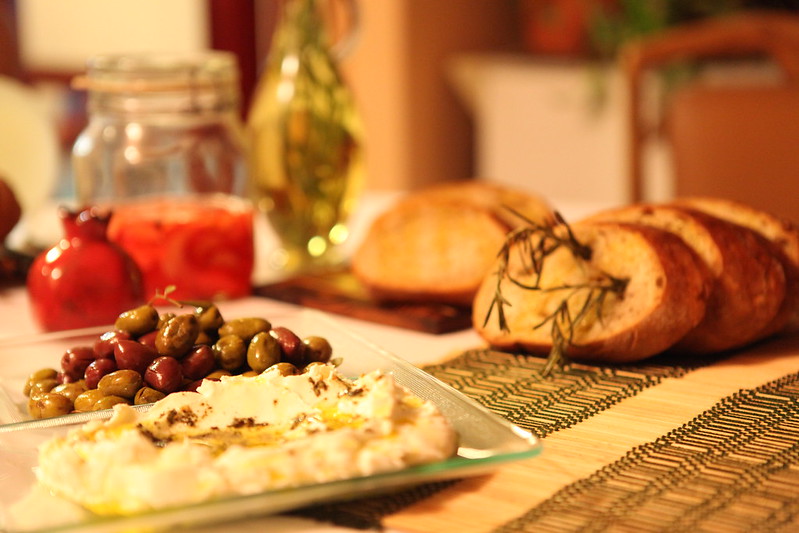Revised Common Lectionary Reflection, Third Sunday after the Epiphany, Year A
January 26, 2020
Lessons: Isaiah 9:1-4; Psalm 27:1, 4-9, 1 Corinthians 1:10-18, Matthew 4:12-23
Theme: God’s faithful and generous people steward carefully the call to follow Jesus, fish for people, and live an alternative reality.
Key Scriptures: And [Jesus] said to them, “Follow me, and I will make you fish for people.” — Matthew 4:19
 Maybe it was the talk about fish and fishing for people in this week’s gospel, but I’ve been thinking a lot this week about real food versus junk food. That line of thinking made for an easy segue into the difference between the good gospel of Jesus and the highly processed gospels the world (and sometimes even the church) tries to feed us. Yes, we humans just can’t seem to keep from hemming God in so that we can feel in control and be comfortable, all the while reducing the gospel to a thoroughly processed, bland little chunk of a meal. Our very efforts to make Jesus palatable and easily accessible more often render the gospel nutritionally and spiritually deficient, a mere nod to real food and spiritual practice.
Maybe it was the talk about fish and fishing for people in this week’s gospel, but I’ve been thinking a lot this week about real food versus junk food. That line of thinking made for an easy segue into the difference between the good gospel of Jesus and the highly processed gospels the world (and sometimes even the church) tries to feed us. Yes, we humans just can’t seem to keep from hemming God in so that we can feel in control and be comfortable, all the while reducing the gospel to a thoroughly processed, bland little chunk of a meal. Our very efforts to make Jesus palatable and easily accessible more often render the gospel nutritionally and spiritually deficient, a mere nod to real food and spiritual practice.
Just as there’s a vast difference between a microwavable dinner from your grocery freezer section and a five-course meal at a four-star restaurant, there’s a virtual chasm between shallow Christianity and deep discipleship and stewardship of all aspects of life. Yep, you may eat Eggplant Parmesan from a freezer box or on fine china, but the two dining events are simply not the same. Likewise, there’s a big difference between a shallow, low-commitment faith life and the kind of “all-in discipleship” to which Jesus invites us. I’m afraid that many good and faithful church folk have come to expect too little from God and, in turn, have settled for way too little from life.
How about this week we make our worship and gospel proclamation into a real feast for the eyes, ears, mind, and heart? Might as well involve the body and include some kinesthetic elements and movement in worship! Our job as worship leaders, preachers, teachers, and congregational leaders is to help people discern the difference between processed crap and the real deal gospel. We have to cast that vision; we have already (I hope) dropped everything to follow Jesus and fish for people. Yet if we’re using cheap bait, the fish aren’t as likely to bite. Likewise, if we’re not catching folks in the wide net of God’s amazing grace and Jesus’ unbounded love, we aren’t tending our nets well.
I know it can be daunting and exhausting to do the work of Christ’s Kindom, especially in times where budgets are shrinking, traditional congregations are quite literally dying out, and even the name Christian has been co-opted by a nationalistic and highly processed version of the faith we share. I get it; I’ve been there. The church is changing and morphing so fast into its next iteration that it’s tough to chart a way forward, to know how to effect change in a time when folks so dearly seem to cling to the nostalgia and false security of the past.
The recipe for discipleship is remarkably similar to whole foods cooking at its finest and most basic. It involves quality ingredients, a commitment to the process, and a willingness to use all of one’s senses, gifts, and talents in an unhurried and beautiful experience of food and relationship. Yes, this is why the difference between real food and processed crap helps me make sense of the good news this week.
Consider the difference between a highly processed, low-nutrition version of the gospel and a real food gospel feast that is presented in this week’s gospel. Jesus must have had some of the same fears and concerns about power, empire, and future that we feel today. He comes out of the desert victorious over the tempter, learns about his cousin’s arrest, and withdraws to Galilee in the north—not to hide in fear but rather to get on with the work of his mission. He calls followers and gets to work “teaching in their synagogues and proclaiming the good news of the kingdom and curing every disease and sickness among the people” (Matt. 4:23). This is an all-in discipleship proposition, but look how the work and the relationships are life changing. Some folks may not be able to imagine how rewarding it is to cook from scratch with good ingredients and fresh spices. If all you have known is TV dinners, it’s pretty tough to sell the labor of love that cooking can be. Discipleship is not that much different; if all you’ve known is a low-commitment membership model of church, it’s difficult to picture the radical and real life of discipleship that Jesus modeled and calls us to. It is not, however, impossible.
 Friends, we are not beyond that sort of life-changing, mind and heart expanding, and creative experience in the body of Christ, the Kindom of God. Plenty of folks are finding that following Jesus leads to new life. Check out the work of the new monastic, dinner church, and Fresh Expressions movements. Ponder how people gather in truck stops to worship and show solidarity with siblings experiencing homelessness, addiction disorders, and trafficking. Consider church in a brewery, at a Laundromat, in the forest, on a farm. Imagine sharing space and energy with art galleries, coffee shops, or theaters, creating encounters with the holy in ordinary settings. When we share the good gospel—that whole food abundant truth—God is able to unleash and equip people to think creatively, contextually, and outside of the box. Yes, beloveds, the gospel is so much fuller, richer, and more beautiful than we can imagine. But, hey, let’s try anyway and see what kind of creative energy the Spirit will cook up among us. Let’s explore an alternative reality known as the Kindom of God.
Friends, we are not beyond that sort of life-changing, mind and heart expanding, and creative experience in the body of Christ, the Kindom of God. Plenty of folks are finding that following Jesus leads to new life. Check out the work of the new monastic, dinner church, and Fresh Expressions movements. Ponder how people gather in truck stops to worship and show solidarity with siblings experiencing homelessness, addiction disorders, and trafficking. Consider church in a brewery, at a Laundromat, in the forest, on a farm. Imagine sharing space and energy with art galleries, coffee shops, or theaters, creating encounters with the holy in ordinary settings. When we share the good gospel—that whole food abundant truth—God is able to unleash and equip people to think creatively, contextually, and outside of the box. Yes, beloveds, the gospel is so much fuller, richer, and more beautiful than we can imagine. But, hey, let’s try anyway and see what kind of creative energy the Spirit will cook up among us. Let’s explore an alternative reality known as the Kindom of God.
In Worship
Consider hymnody today that proclaims the glory, love, and creativity of God. Some suggestions: “Many and Great, O God” (text by Joseph Renville set to a Dakota tune), “Beautiful Savior” (text translated by Joseph A. Seiss, set to a Silesian folk tune), “We have seen the Lord” (Tanzanian traditional hymn), or “For the beauty of the earth” (Text by Folliott S. Pierpoint, music by Conrad Kocher). Find ways to weave awe and wonder in your liturgy.
With Youth
Use this week’s epistle lesson to discuss what Paul means when he writes to the Christians at Corinth: “Now I appeal to you, brothers and sisters, by the name of our Lord Jesus Christ, that all of you be in agreement and that there be no divisions among you, but that you be united in the same mind and the same purpose” (1 Cor. 1:10). What is similar about our time to the time when Paul wrote? What is different? What do you notice about Paul’s words? Anything jump out? What might Paul write to the church today (both in general and to your worshiping community)? How can you be a force for unity, helping to shape mind and purpose?
With Children
This week’s focus verse is 1 Corinthians 1:10. “Now I appeal to you, brothers and sisters, by the name of our Lord Jesus Christ, that all of you be in agreement and that there be no divisions among you, but that you be united in the same mind and the same purpose.”
Share some version of this story with the children: Once upon a time in a place far, far away the church went for a walk. Now when I say “the church,” I’m talking about the Body of Christ, of which we, and all people who follow Jesus, are a part. We who meet here in this place are a part of that body. What part would you say we are? Suppose then we are a hand. Maybe the people in the church down the road are an arm. All of us form the body. We may look different. We may have different gifts and talents; an arm does much different work than lungs do, or a heart does different work than a toe does. But we all form a strong body when we work together. But back to the story. . . (Note: You can assign children body parts to have them help act out the story if you want.)
The Body of Christ went for a walk one day to shine the light of the gospel in a shadowy world. The left leg thought the body should go left. The right leg determined the body should go right. The brain sent an order to stop. The left hand was annoyed at having to stop and tried to hit the head, but the left forearm would not cooperate. So the body stopped and began arguing with itself. The legs threatened to walk off the job altogether.
“Fat chance!” retorted the arms. “Try being sandwiched between hands and shoulders. You’ll learn to get along then.”
The left pinky toe was tired of all the bickering and slammed itself into a tree root. “Owwwwww!” said the brain and the nerves that carried the signal. “Why did you do that?” asked the brain.
Poor pinky toe was still reeling from contact with the tree root but managed to say that everyone needed to get along and work together. “If we represent Jesus in the world,” said pinky toe, “we need to act like Jesus and quit being so difficult and hard to get along with. We want other people to join us, not run away from us,” pinky toe said.
All the cells and parts of the body paused to think about what pinky toe had done and said. They all agreed that they should work together as Christ’s Body. The right hand wrote up an agreement to which all parts of the body affixed their seal of approval. The body then broke up into committees to develop a vision and a plan and rules. Meanwhile the Body wasn’t really walking anywhere, when all the Body of Christ really wanted to do was to go walking in the world sharing good news, lifting people up, sharing, and caring.
“It should be simple,” said the heart. “Why are we making it so complicated?”
“That’s what I’m trying to communicate,” said pinky toe. “We can do so much better when we all work together, when we are ‘united in the same mind and the same purpose.’”
“But what if I still want to go left?” asked left leg.
“Or if I want to go right?” said right leg.
“We’ll have to take it one step at a time and try to work together,” said pinky toe. “Let’s try it! Let’s all take one step forward. Everything begins with one step.”
“That sounds like a smashing idea,” said stomach, “but I’m hungry. Could we take one step at a time toward lunch?”
And that is how the Body of Christ works together, one step at a time. Those words that Paul wrote to a church a couple of thousand years ago still make sense for us today. Let’s pray for unity and shared purpose in Christ’s Body.
Dear God (Dear God),
Give us wisdom (give us wisdom) to work together (to work together) and to seek the same purpose (and to seek the same purpose) of sharing your love (of sharing your love) and your good news (and your good news) with everybody we meet. (with everybody we meet) Amen. (Amen.)
Weekly Stewardship Bulletin Insert
As stewards of the good news of Jesus Christ, we fish for people and offer them a gourmet gospel that nourishes and satisfies instead of proffering some junk food version of Jesus.
Stewardship at Home
How about inviting some friends over to cook a meal together from scratch? Choose an adventuresome menu–maybe some ethnic food you love–and prepare a feast of fresh, healthy food. Spend some time talking about what really satisfies and listening to others’ stories. Consider how to make your feast as ethical as possible by choosing free range organic meats and cheeses, fresh vegetables and fruits (organic and locally sourced if possible), and fresh spices and herbs. Looking for ideas and inspiration? A book about food and faith that I highly recommend is Ellen Kanner’s Feeding the Hungry Ghost: Life, Faith, and What to Eat for Dinner. In it you’ll find delicious plant-based recipes and wonderful writing about seasonal eating, faith, and the wonders of food.
2017 Reflection: https://www.stewardshipoflife.org/2017/01/called-together/
2014 Reflection: https://www.stewardshipoflife.org/2014/01/jesus-in-pieces/
2011 Reflection: https://www.stewardshipoflife.org/2011/01/immediately/
Images: State of Israel; Geezaweezer; and John Ragai, Creative Commons usage license. Thanks!
Note: Reprint rights granted to congregations and other church organizations for local, nonprofit use. Just include this note: “Copyright (c) 2020, Rev. Sharron Blezard. Used by Permission.” Other uses, please inquire: thewritelife@hotmail.com.




Leave a Reply